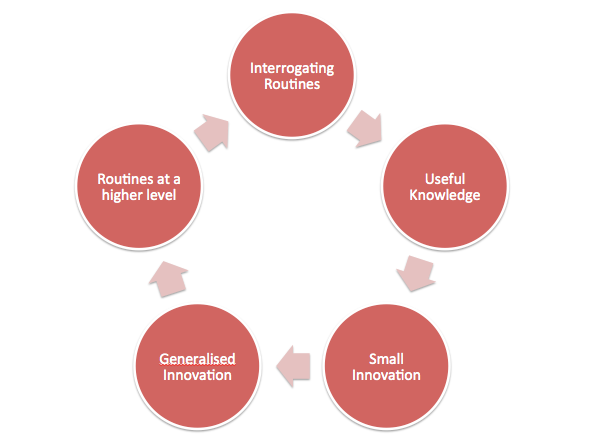Blatchford's recipe for success has 5 steps (I reproduced these in the graphic above):
- Confront comfortable orthodoxies and challenge why and what you are doing
- Gather data from students, parents, teachers, governors and other sin the community to identify strengths and weaknesses
- Initiate small scale innovation to solve problems thoughtfully and at the right pace
- As the small innovations win the hearts and minds of others, whole scale innovation will take root
- The school is now on a higher operational level and can start again to question the routines (but this time from a better place)
At ASB we often talk about innovation being in our DNA - this recipe has shown how innovation has come to be part of our lifeblood. Other factors that Blatchford writes about that resonate with ASB are the rich opportunities for teachers to conduct meaningful action research. Recently in R&D we read the book Accelerate by John P Kotter who writes about the need to create a sense of urgency in order to bring about change. Kotter writes about role modeling urgency - influencing 10 other people, who in turn will each influence another 10, leading to exponential growth of a change mindset. He explains that this role modeling can be very simple - talking to people in the hallways, for example, or raising issues in meetings, telling people about what you are doing and why what you are doing is important, and in this way gradually influencing those around you to start to think in new ways too. Blatchford agrees with the necessity of urgency. He writes that in thriving schools "school leaders place great store by how well they create "a sense of urgency at the right time". He also points out that these leaders believe that a change that is worth introducing, one that improves students' experiences, should be brought in without delay - and not postponed to a convenient point in the school's calendar such as the following year or semester. He calls this "accelerating change when change is required".
Another factor that Blatchford writes about in successful schools is that timely communication of the highest quality is modelled by senior leaders. He explains that this communication is always anticipating the community's interests and concerns - and so dispels rumour, gossip and anxiety. This again made me think of ASB. Our Superintendent, Craig Johnson, sends out a weekly Vichar message to parents (the word "vichar" is a Hindi word that means thought and consideration). Recently when local Indian newspapers wrote about jihadist threats against Western schools, he immediately communicated to parents and teachers both by email and by holding meetings to discuss concerns.
At ASB the voices of students are also listened to and form an integral part of the development of the school. Blatchford writes "an excellent school is one in which everyone feels they are making a contribution ... all students and staff believe and know they have a 'next step' to make within an institution and that the institution supports, values and celebrates those next steps."
Finally, and this is where we get to the title of this post, Blatchford writes that the successful school is "thoughtfully outward-facing", allowing teachers to work on external agendas. Again this calls to mind the work being done by ASB's teachers for organizations such as the IBO, visits that teacher make to IB World Schools to authorize and evaluate them, partnerships built with other schools in various collaboratives, presentations and workshops that ASB's teachers and administrators share at global conferences and the summits and conferences that ASB itself hosts for both local and international schools. Our teachers are not only sharing their expertise but are also bringing back good ideas and strong practices from external sources that can be incorporated into their own classrooms.

No comments:
Post a Comment